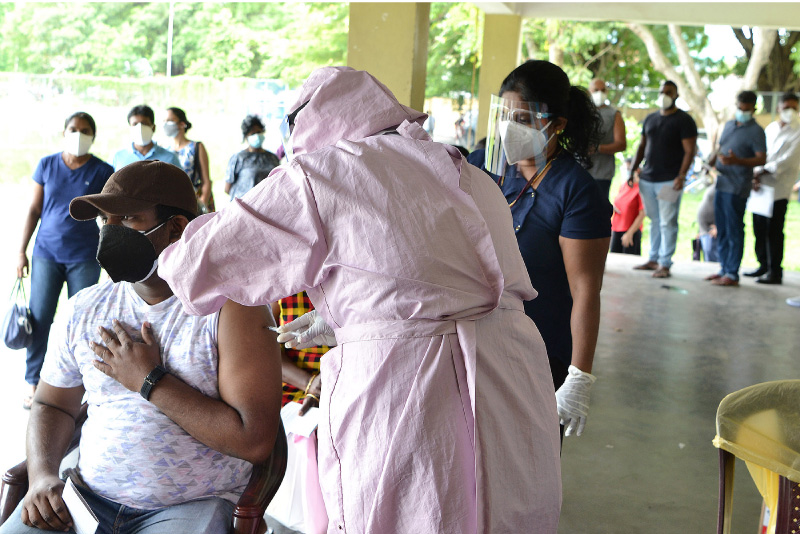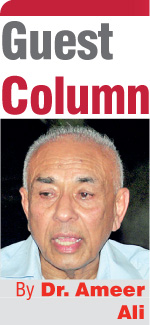Monday Feb 16, 2026
Monday Feb 16, 2026
Monday, 31 May 2021 00:00 - - {{hitsCtrl.values.hits}}

What makes the situation worse is the continuing prejudices and power play that are preventing experts in handling the vaccine roll-out professionally and methodically – Pic by Shehan Gunasekara
 Sri Lanka is facing challenges on multiple fronts. To elaborate this further is to repeat the obvious. The MV X-Press Pearl disaster is the latest of its woes. However, the most important issue at the moment that occupies national attention is the battle against the pandemic. Irrespective of one’s political and ideological differences there is no room for disagreement or compromise in the fight against this plague.
Sri Lanka is facing challenges on multiple fronts. To elaborate this further is to repeat the obvious. The MV X-Press Pearl disaster is the latest of its woes. However, the most important issue at the moment that occupies national attention is the battle against the pandemic. Irrespective of one’s political and ideological differences there is no room for disagreement or compromise in the fight against this plague.
Unfortunately, and criminally, the early successes achieved in this fight were wasted by the Government when it recklessly loosened the controls it imposed and monitored originally, all in the interest of winning an election. For instance, rules were relaxed to canvass votes among Hill Country Tamils, by allowing public funeral procession for the Late Arumugam Thondaman. Similarly, just to please voters, large gatherings were allowed during New Year celebrations and even for private tamashas.
No wonder then, the enemy struck with a vengeance and its new wave of attack is proving dangerously lethal. Official figures, which are not accurate, show that there is on average one death every hour due to COVID.
True, the country is ill-equipped to handle this national calamity, because of long-time neglect of public healthcare by successive governments. This neglect is part of the price the nation is paying now for its honeymoon with neo-liberal economic strategies. Privatisation of parastatals in favour of private enterprise and profit motive, and in the name of enhancing efficiency and productivity went hand in hand with reduction in budgetary allocations for public hospitals and healthcare. This grand neglect left the nation totally unprepared to confront a pandemic like the present one.
Will there be at least a partial reversal of this policy now and will the Government invest in improving the facilities and increasing medical personnel in public hospitals? The World Bank’s willingness to assist in this regard is encouraging.
Be that as it may, what makes the situation worse is the continuing prejudices and power play that are preventing experts in handling the vaccine roll-out professionally and methodically. The Association of Medical Specialists has criticised the pandemonium prevailing in the roll out plan, caused by interference of powerful politicians and trade unionists. This is symptomatic of the way in which the country is governed now.
Already the country is disunited and rulers see political benefits in keeping the nation like that. They are governing deliberately to the benefit of their chosen ones. Even in the fight against COVID they seem to view the life of some more precious than that of others.
From the time this regime came to power, there had been a noticeable aversion towards independent expert and scientific advice on issues confronting the nation. Nowhere was that aversion demonstrated more stubbornly than in handling the pandemic. How then could one explain the shocking presence in the cabinet of a Minister of Health, who advocated holy water as panacea for COVID and got infected by the virus as a result? How does one explain the Government’s indirect promotion through its silence, the sale of Dhammika Bandara’s magic potion? How else could one understand the regime’s more than a year-long refusal to permit Muslims to bury their COVID-dead bodies and forced cremation, when renowned epidemiologists from all over the world and from WHO were insisting that there was no danger of the virus spreading from burials.
President GR’s reliance on the advice of his handpicked Viyathmaga experts, trade union leaders and other in-house specialists is obviously politically motivated mixed with his power cartel’s selfish agenda. How can a nation develop with such distrust and disrespect to scientific expertise and professionalism? There is information leaking that certain groups are profiteering from the import of the Sinopharm vaccine.
The same aversion towards non-partisan expertise was demonstrated in the President’s decision to ban outright the import of chemical fertilisers. There are now complaints not only from paddy cultivators but also from producers of commercial crops. The objective behind the ban is no doubt noble, but the operatory mechanism is horribly faulty. Why did the Government avoid listening to independent expert agronomists?
This dislike towards consultation with scientific expertise is a reflection of the sickness in Sri Lankan society that has been historically groomed to equate knowledge and wisdom with social status and political power. Just because a country is advanced in terms of literacy rate and is overflowing with university degree holders does not mean that its society has become rational in outlook and thinking. Where monks, mullahs, palmists and swamis are able to hold sway over thoughts and actions of rulers and politicians, science, rationalism and critical thinking obviously have to take back seats.
More than 70 years of independence and development has failed to eradicate this fundamental sickness. The pandemonium prevailing in fighting against the pandemic is just one of its symptoms.
Sarath De Alwis, in concluding his ‘riposte to Dr. Dayan Jayatilleka …’ (Daily Financial Times, 29 May 2021), has the following to say: “If a better economic model is to be created, we should first bring about profound existential and moral changes in our society”. Not only for economic models even for other paradigms to succeed those changes are indispensable. Yet, how can those changes occur when people are trained and indoctrinated to trust purveyors of false truths?”
(The writer is attached to the School of Business and Governance, Murdoch University, Western Australia.)